When it comes to home maintenance, some plumbing issues are obvious—burst pipes, dripping faucets, or standing water in your yard. But other problems can lurk silently, slowly creating damage behind walls, under cabinets, or even beneath your flooring. One of the most deceptive and damaging issues homeowners face is kitchen pipe leaks.
Unlike a faucet leak you can see and hear, these hidden issues may go unnoticed for weeks—or even months. By the time a homeowner realizes what’s happening, the water damage can already be extensive, leading to warped wood, mold growth, ruined cabinetry, and costly repairs.
At Leak Experts USA, we’ve helped countless homeowners navigate the stress and expense of plumbing issues. Our experience in the field shows that kitchen pipe leaks are among the trickiest to identify early. In this blog, we’ll explain why these leaks are so hard to catch, what warning signs to look out for, and how professional detection can save your kitchen (and your wallet).
📞 Got a leak right now? Call (702) 745-5571 to schedule a same-day inspection with us.
Table of Contents
- Why Kitchen Pipe Leaks Are So Hard to Spot
- Common Areas Where Leaks Hide in the Kitchen
- Warning Signs of Hidden Kitchen Leaks
- How Water Damage Affects Kitchen Cabinets and Flooring
- Why DIY Fixes Often Fail
- Professional Tools for Detecting Tricky Leaks in Kitchens
- Preventative Maintenance Tips for Homeowners
- Why Timely Repairs Save You Money
- The Role of Water Pressure in Kitchen Pipe Leaks
- Mold Growth: The Silent Consequence of Kitchen Leaks
- Why Professional Maintenance Beats Emergency Repairs
- Choosing the Right Plumber for Your Kitchen Leak
- FAQs About Kitchen Pipe Leaks
Why Kitchen Pipe Leaks Are So Hard to Spot
Unlike bathrooms or laundry rooms, your kitchen combines multiple plumbing connections in one small area. Between sinks, dishwashers, ice makers, and water filtration systems, there are several pipes, valves, and joints hidden inside cabinets and walls.
The main reason kitchen pipe leaks are difficult to detect is that water rarely pools out in the open. Instead, it seeps behind cabinetry, runs along baseboards, or collects under flooring. Because these areas are out of sight, homeowners may not notice an issue until they start smelling mildew or see warped wood.
Add to that the frequent use of under-sink storage, and things become even more complicated. Cleaning products, trash bins, and other household items often hide early signs of moisture.
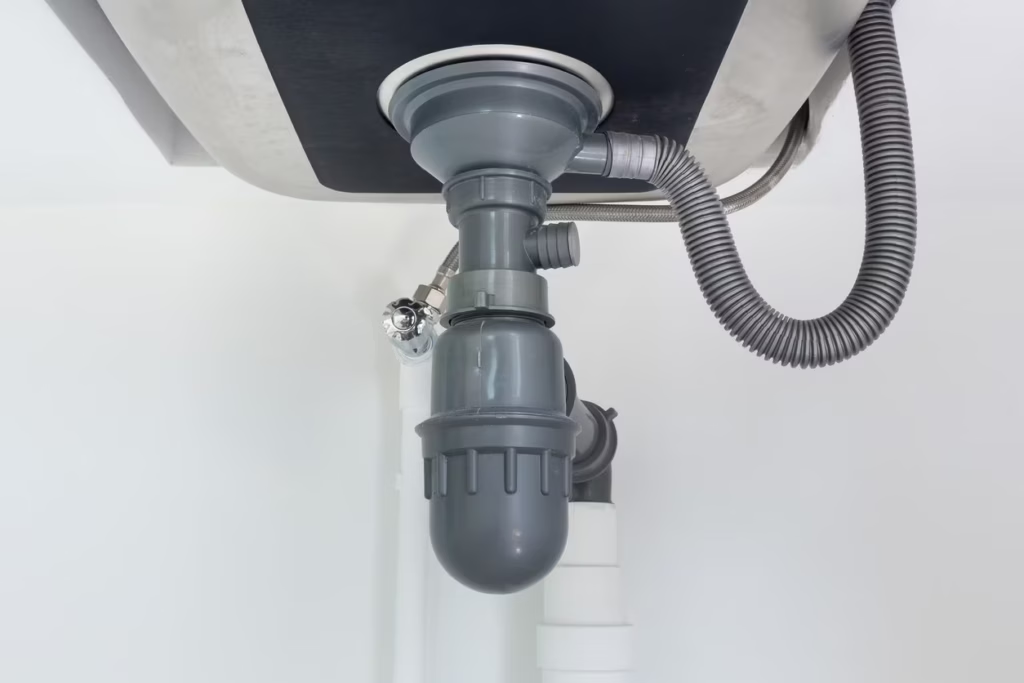
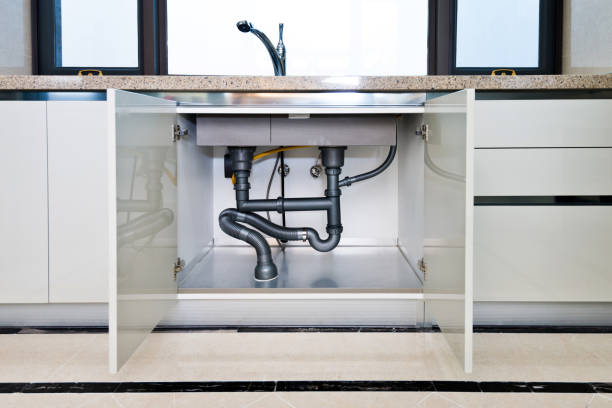

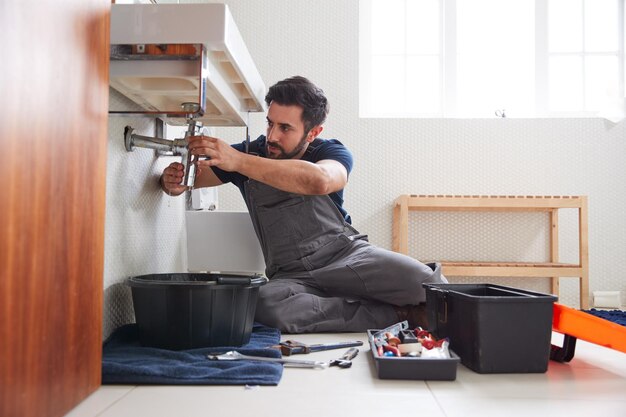
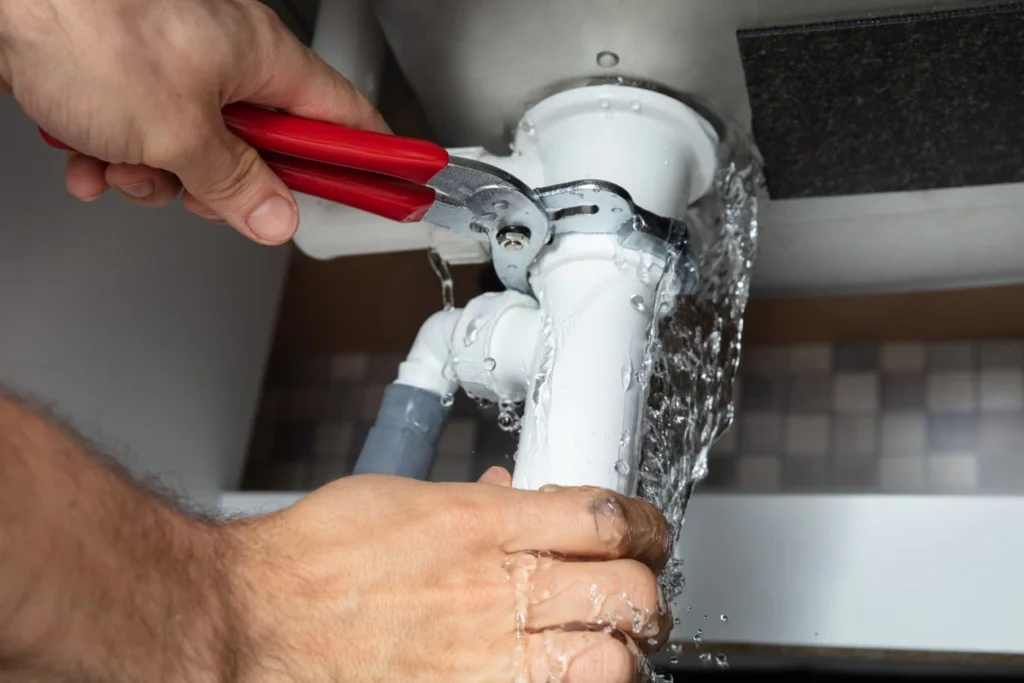
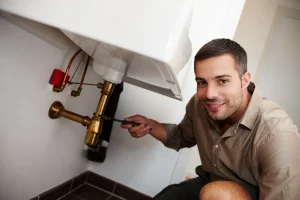
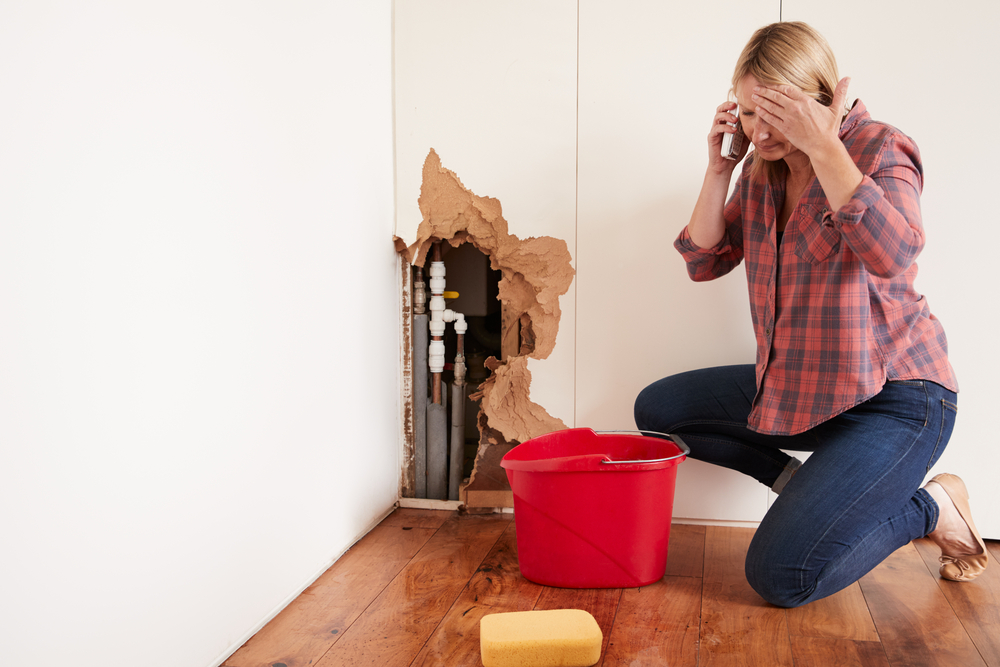
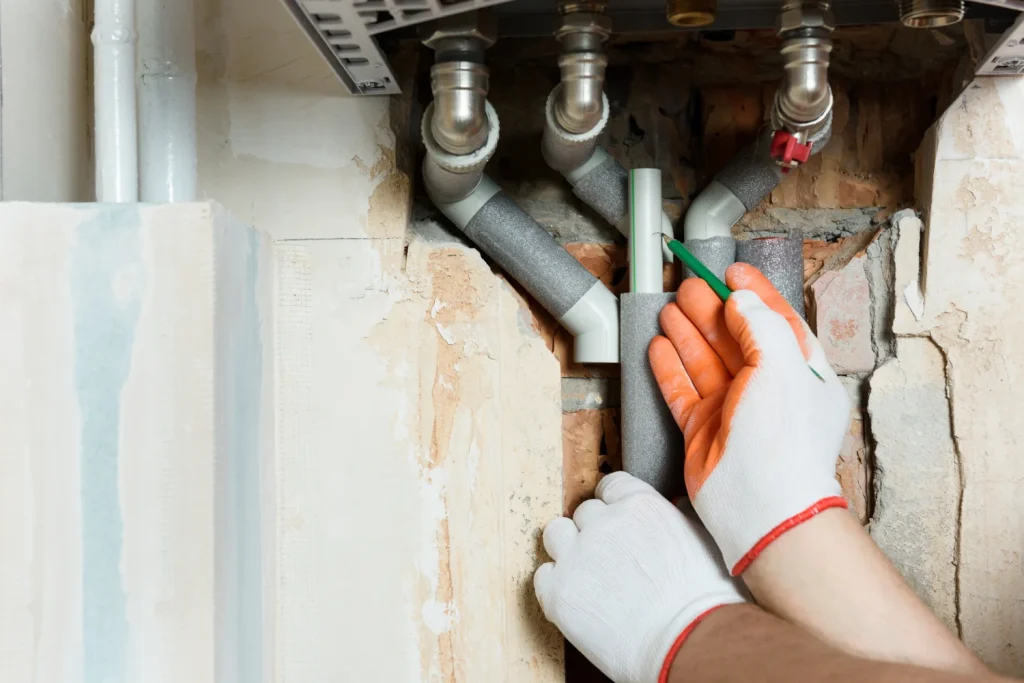
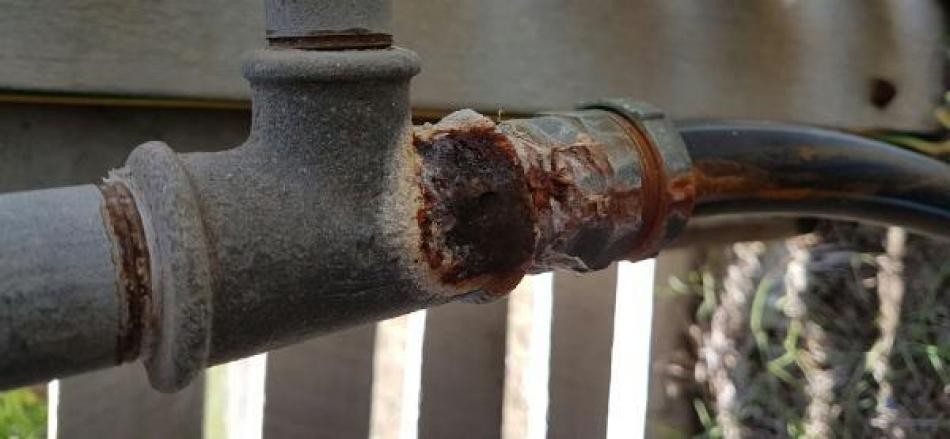
Common Areas Where Leaks Hide in the Kitchen
Kitchen plumbing is more complex than most homeowners realize. Here are the most common places we find hidden kitchen leaks:
- Under Sink Plumbing: The most frequent source of trouble, thanks to loose joints, worn-out seals, or failing garbage disposals.
- Dishwasher Connections: Small cracks or loose hoses can allow water to drip slowly during wash cycles.
- Refrigerator Water Lines: If your fridge has an ice maker or water dispenser, the supply line is a potential culprit.
- Wall Supply Lines: Leaks inside the wall are particularly tricky since you may not see any signs until water damage spreads.
When our technicians investigate these areas, we often find long-term leaks that were active for months. By then, homeowners are dealing with not just plumbing repairs but also extensive water damage.
Warning Signs of Hidden Kitchen Leaks
Even if you can’t see a steady drip, your home may still be showing subtle signs of tricky leaks in the kitchen. Watch for:
- Musty or damp odors inside kitchen cabinets
- Warped or swollen wood on cabinet bases
- Discoloration or bubbling paint near sink areas
- Sudden ant or cockroach activity (pests are attracted to moisture)
- Unexplained water bills that seem higher than usual
If you notice any of these, don’t ignore them. What looks like a small nuisance today could be a sign of a much larger plumbing issue hiding out of sight.
How Water Damage Affects Kitchen Cabinets and Flooring
One of the biggest risks of kitchen pipe leaks is structural damage. Unlike bathroom tiles, kitchen flooring often uses wood, laminate, or engineered materials—all of which absorb water. Over time, this leads to warping, discoloration, and even buckling.
Cabinets are also highly vulnerable. Water damage kitchen cabinets can cause swelling, peeling veneer, and mold growth. Once moisture compromises cabinetry, replacement is often the only option, and that can mean thousands of dollars in renovation costs.
By calling us at the first sign of trouble, you can often prevent minor leaks from spiraling into full kitchen remodels.
Why DIY Fixes Often Fail
Plenty of homeowners try to handle leaks on their own with plumber’s tape how to fix, sealant, or tightening connections. While this might slow the drip temporarily, most DIY solutions fail because they don’t address the root cause.
For example:
- A corroded pipe joint will continue to deteriorate even if sealed.
- A loose dishwasher hose may drip only during certain cycles, fooling homeowners into thinking it’s to fix a leaky pipe.
- Hidden leaks inside walls are virtually impossible to access without professional tools.
We’ve seen many Las Vegas homeowners spend weeks trying to solve a leak, only to call us when the damage becomes obvious. Professional leak detection prevents wasted time and costly mistakes.
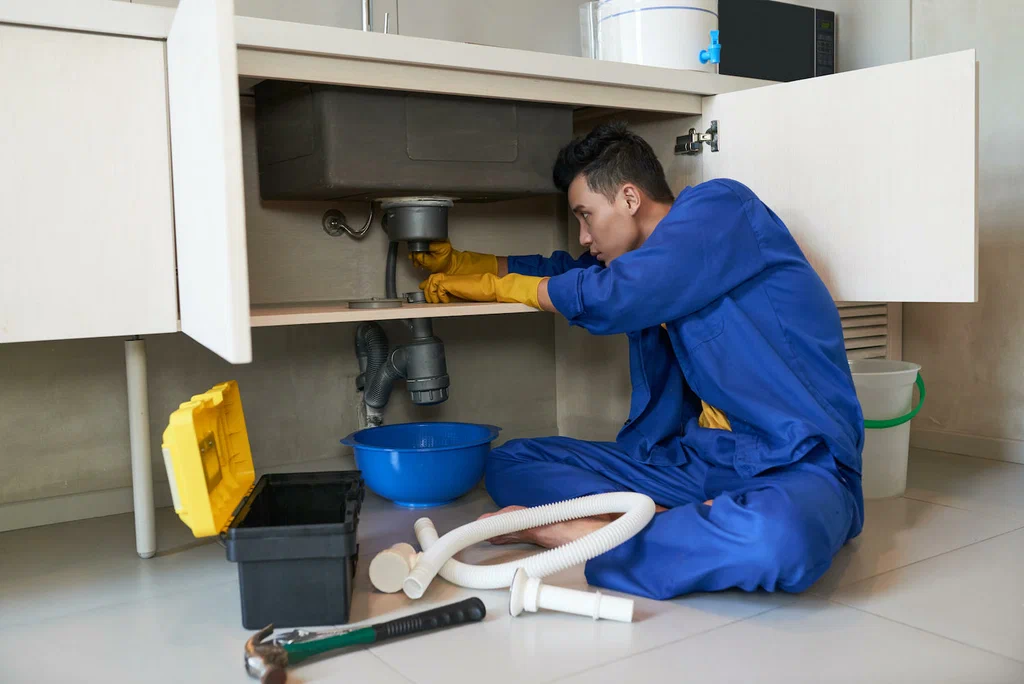
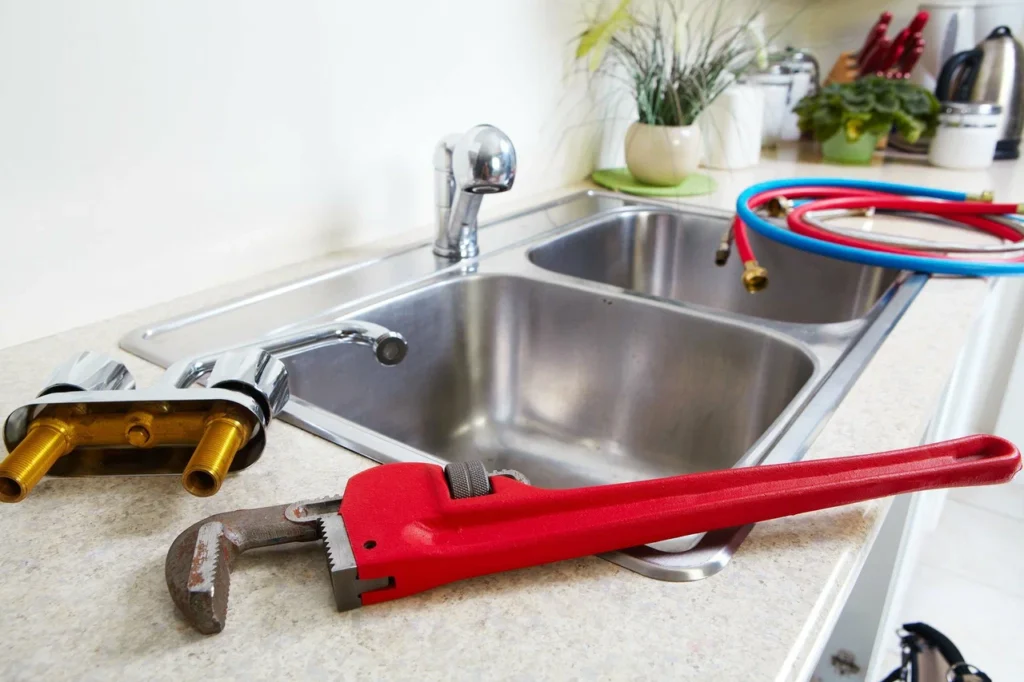
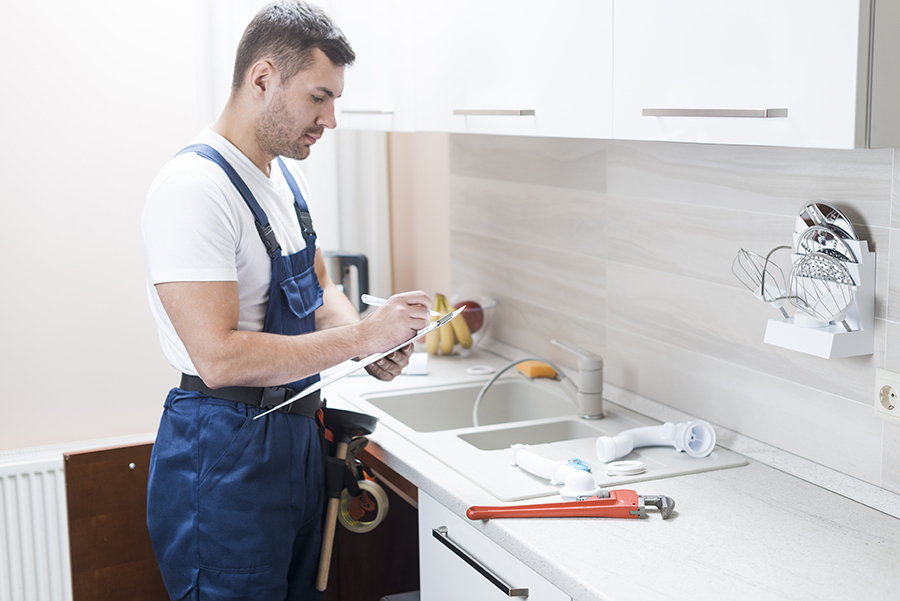
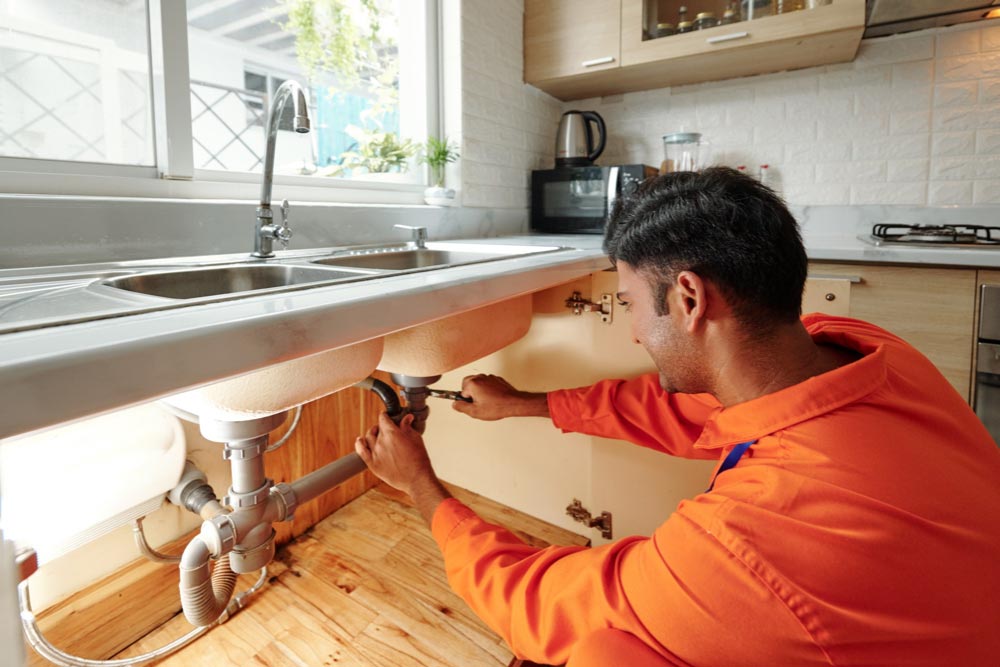


Professional Tools for Detecting Tricky Leaks in Kitchens
Atthis company, we use advanced technology to detect leaks without tearing up your walls or floors unnecessarily. Our methods include:
- Moisture Meters to detect dampness behind surfaces
- Infrared Thermal Imaging to identify temperature changes caused by water leaks
- Acoustic Detection to listen for subtle pipe drips within walls
- Pressure Testing to determine if the plumbing system is losing water
These tools allow us to pinpoint hidden kitchen leaks accurately, saving homeowners from the stress of unnecessary demolition.
Preventative Maintenance Tips for Homeowners
The best way to avoid the headaches of kitchen pipe leaks is through prevention. Here are some habits that can protect your plumbing:
- Inspect under sink plumbing every few weeks for signs of dampness.
- Don’t overload cabinets—items pressing against pipes can loosen connections.
- Check appliance hoses (dishwasher, refrigerator) annually.
- Install a water alarm in cabinets to alert you of leaks early.
- Schedule annual plumbing inspections with a trusted provider like us.
Small steps today can prevent major damage tomorrow.
Why Timely Repairs Save You Money
Delaying plumbing repairs is one of the most expensive mistakes a homeowner can make. Even a slow drip can waste hundreds of gallons of water each month, driving up utility bills. More importantly, the cost of repairing water damage kitchen cabinets or flooring far exceeds the cost of a simple plumbing fix.
Quick action means:
- Lower water bills
- Preserved home value
- Reduced mold risk
- Longer lifespan for cabinets and flooring
📞 Don’t wait until damage spreads—call us at (702) 745-5571 for fast, professional help. Follow us on Instagram for regular updates!
The Role of Water Pressure in Kitchen Pipe Leaks
Most homeowners don’t think about water pressure unless it suddenly drops during a shower. But behind the scenes, water pressure plays a huge role in the development of kitchen pipe leaks.
When pressure inside your plumbing system is consistently too high, it puts extra strain on joints, seals, and appliance connections. Over time, this pressure can cause tiny cracks or loosen fittings—especially in under sink plumbing and dishwasher hoses. While these leaks may start small, they often expand quickly, causing significant water damage before they’re noticed.
Signs your water pressure may be too high:
- Pipes that bang or vibrate when water is turned on (known as “water hammer”)
- Faucets that spray or mist instead of flowing smoothly
- Appliances wearing out sooner than expected
The ideal household water pressure typically ranges from 40 to 60 psi. Anything higher than this could be creating the perfect environment for hidden kitchen leaks.
We often recommend installing a pressure regulator for homes in Las Vegas neighborhoods where municipal pressure runs on the higher side. This small investment helps extend the lifespan of your plumbing system and prevents costly surprises.
Pro Tip: If you’ve had repeated issues with kitchen pipe leaks, ask your plumber to test your water pressure during the inspection. It’s a simple step that can reveal a major underlying cause.
Mold Growth: The Silent Consequence of Kitchen Leaks
One of the biggest dangers of tricky leaks in the kitchen isn’t the water itself—it’s what happens after. Lingering moisture creates the perfect breeding ground for mold and mildew, which can spread quickly in dark, confined areas like under cabinets.
Why mold is a serious issue:
- Health Risks: Mold spores can aggravate allergies, asthma, and respiratory conditions.
- Property Damage: Once mold penetrates wood or drywall, it can be extremely difficult to remove without replacing materials.
- Odor Problems: Even small amounts of mold create a persistent musty smell that’s tough to mask.
In kitchens, mold often hides in places you rarely check:
- The back panel of cabinets near under sink plumbing
- Behind dishwashers or refrigerators with leaking supply lines
- Inside wall cavities where hidden kitchen leaks drip slowly over time
Unfortunately, by the time you notice visible spots or strong odors, mold colonies may already be widespread. That’s why early detection of kitchen pipe leaks is essential.
Our inspections don’t stop at fixing the plumbing—we also evaluate the surrounding area for early signs of mold or water damage. Catching this problem early not only saves repair costs but also protects your family’s health.
Remember: Water damage kitchen cabinets is not just cosmetic. If left unchecked, it could be a sign of mold growth right under your nose. Follow us on Instagram for regular updates!
Why Professional Maintenance Beats Emergency Repairs
It’s human nature to call a plumber only when something goes wrong. But with kitchen pipe leaks, waiting until an emergency strikes is often the most expensive route. Preventative maintenance, on the other hand, helps homeowners avoid disasters before they start.
Here’s why professional maintenance makes all the difference:
- Early Detection: Annual inspections uncover small leaks or weak spots before they cause water damage.
- Appliance Longevity: Regular checks of dishwasher and refrigerator connections reduce wear and tear.
- Cost Savings: Repairing a small drip costs far less than replacing cabinets or flooring after long-term damage.
- Peace of Mind: Knowing your kitchen plumbing is secure lets you focus on family and daily life, not surprise repairs.
We recommend homeowners schedule a yearly plumbing inspection—much like a yearly HVAC service. During these visits, we check all visible and accessible areas of your under sink plumbing, appliance lines, and wall connections.
This proactive approach is especially valuable for homeowners in Las Vegas, where hard water can accelerate wear on plumbing components. By addressing minor issues early, we save our customers from unexpected bills and stressful last-minute emergencies.
Takeaway: Don’t wait for a flooded kitchen to remind you of the importance of plumbing care. Preventative maintenance is always to fix cheaper, easier, and less stressful than emergency repairs.
Choosing the Right Plumber for Your Kitchen Leak
When you’re dealing with tricky leaks in the kitchen, you don’t just need a plumber—you need a leak detection specialist. We’ve built our reputation as Las Vegas’s most trusted plumbing company by combining advanced technology with decades of hands-on experience.
Here’s what sets us apart:
- Same-day service and emergency response
- Transparent pricing with no hidden fees
- Certified technicians who specialize in leak detection
- A commitment to protecting your home from unnecessary damage
Whether it’s under sink plumbing, dishwasher connections, or wall supply lines, we handle every job with precision.
FAQs About Kitchen Pipe Leaks
Q1: How do I know if I have a hidden kitchen leak?
Look for musty odors, cabinet swelling, or unexplained water bills. Professional detection is the only way to confirm for sure.
Q2: Are kitchen pipe leaks dangerous?
Yes—besides water damage, they create ideal conditions for mold, which can affect your family’s health.
Q3: Can I prevent leaks from happening?
You can reduce risks by scheduling annual inspections, checking appliance hoses, and installing water alarms.
Q4: What if the leak is inside my wall?
That’s where we come in. Our non-invasive tools let us locate leaks without tearing apart your home unnecessarily.
Let Leak Experts USA Protect Your Kitchen
Your kitchen is the heart of your home, but it’s also one of the most vulnerable areas for plumbing issues. Kitchen pipe leaks are sneaky, damaging, and expensive if left untreated—but with the right help, they don’t have to be a homeowner’s nightmare.
At Leak Experts USA, we’ve earned the trust of homeowners across the valley by providing:
- Reliable leak detection services
- Fast repairs with minimal disruption
- Honest guidance tailored to your home’s needs
From under sink plumbing to advanced leak detection, we’re here to protect your kitchen, your cabinets, and your peace of mind.
📞 Call (702) 745-5571 today and schedule your inspection with Las Vegas’s most trusted leak detection company for restaurant plumbing services Las Vegas. Follow us on Instagram for regular updates!

